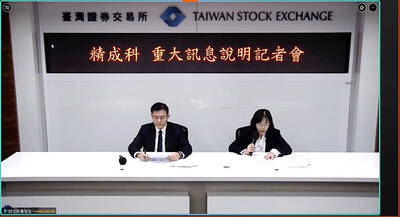The Industrial Technology Research Institute (ITRI, 工研院) is working on improving production technologies related to dye-sensitized solar cells, hoping to mass produce the low-cost compotent in three to five years, sources at the Hsinchu-based institution said yesterday.
ITRI officials said that although its prototype cells have an energy conversion rate of 6 percent, lower than the optimal 10 percent rate achieved in the laboratory, the efficiency is still good enough for commercial purposes.
ITRI’s prototype dye-sensitized solar cells are being presented to the public at the three-day Taiwan Nano 2008 Exhibition in Taipei.
The sixth Taiwan Nano Exhibition, the second biggest of its kind in Asia, focuses on the latest nano applications in household items, including nano ceramics, nano light-emitting diodes and nanocatalysis.
The first dye-sensitized solar cell was developed in 1991 by two Swiss-based scientists, Michael Graetzel and Brian O’Regan at the Ecole Polytechnique Federale de Lausanne.
The cells use titanium dioxide-laced dye material to capture photons. The energy in the particles can then be converted to electrical energy.
Although dye-sensitized solar cells are far less efficient in capturing energy than conventional silicon crystal solar cells, which have conversion rates of 30 percent or more, they still have market potential because of their inexpensive production costs — roughly 80 percent to 90 percent lower than the silicon crystal version.
Dye-sensitized solar cells have yet to be marketed commercially, but ITRI researchers said gains have been made in the development process and two patents related to the process have been obtained in Taiwan, giving the institute confidence that the solar cell can be commercialized by 2011.
“These solar cells, which combine nanocrystal technology and nano thin films, are efficient in converting sunlight into electrical energy,” Tung Yung-liang, an ITRI senior researcher, said on Wednesday.
Within three to five years, the cells could be incorporated into marketable products, Tung said.

Honda Motor Co absorbing Nissan Motor Co could give the two struggling Japanese brands the scale they need to take on China’s BYD Co (比亞迪), sales figures released yesterday showed. Honda, which earlier this week sketched out plans for a deal that amounts to an acquisition of Nissan, sold 3.43 million cars globally in the first 11 months of this year. Nissan said it sold just over 3 million. China’s biggest automaker BYD sold 3.76 million vehicles over the same period — a clear illustration of how Nissan and Honda are weak alone, but together might have a fighting chance. Honda and Nissan

SEMICONDUCTORS: Samsung and Texas Instruments would receive US$4.75 billion and US$1.6 billion respectively to build one chip factory in Utah and two in Texas Samsung Electronics Co and Texas Instruments Inc completed final agreements to get billions of US dollars of government support for new semiconductor plants in the US, cementing a major piece of US President Joe Biden administration’s CHIPS and Science Act initiative. Under binding agreements unveiled Friday, Samsung would get as much as US$4.75 billion in funding, while Texas Instruments stands to receive US$1.6 billion — money that would help them build facilities in Texas and Utah. The final deals mean the chipmakers can begin collecting the funding when their projects hit certain benchmarks. Though the terms of Texas Instruments’ final agreement is

Call it an antidote to fast fashion: Japanese jeans hand-dyed with natural indigo and weaved on a clackety vintage loom, then sold at a premium to global denim connoisseurs. Unlike their mass-produced cousins, the tough garments crafted at the small Momotaro Jeans factory in southwest Japan are designed to be worn for decades, and come with a lifetime repair warranty. On site, Yoshiharu Okamoto gently dips cotton strings into a tub of deep blue liquid, which stains his hands and nails as he repeats the process. The cotton is imported from Zimbabwe, but the natural indigo they use is harvested in Japan —

Printed circuit board (PCB) maker Global Brands Manufacture Ltd (精成科技) is to fully acquire Japanese peer Lincstech Co for about NT$8.4 billion (US$256.9 million) as the company aims to add high-end PCBs to its PC-centric product lineups. The company also expects the deal to help expand its manufacturing sites in Southeast Asia, as local firms diversify to mitigate geopolitical risks. “The acquisition will mean an important step for the company to further expand its presence in Southeast Asia and globally,” Global Brands Manufacture chief financial officer Weng Chia-yu (翁家玉) said at a news conference in Taipei yesterday. The company has set up manufacturing